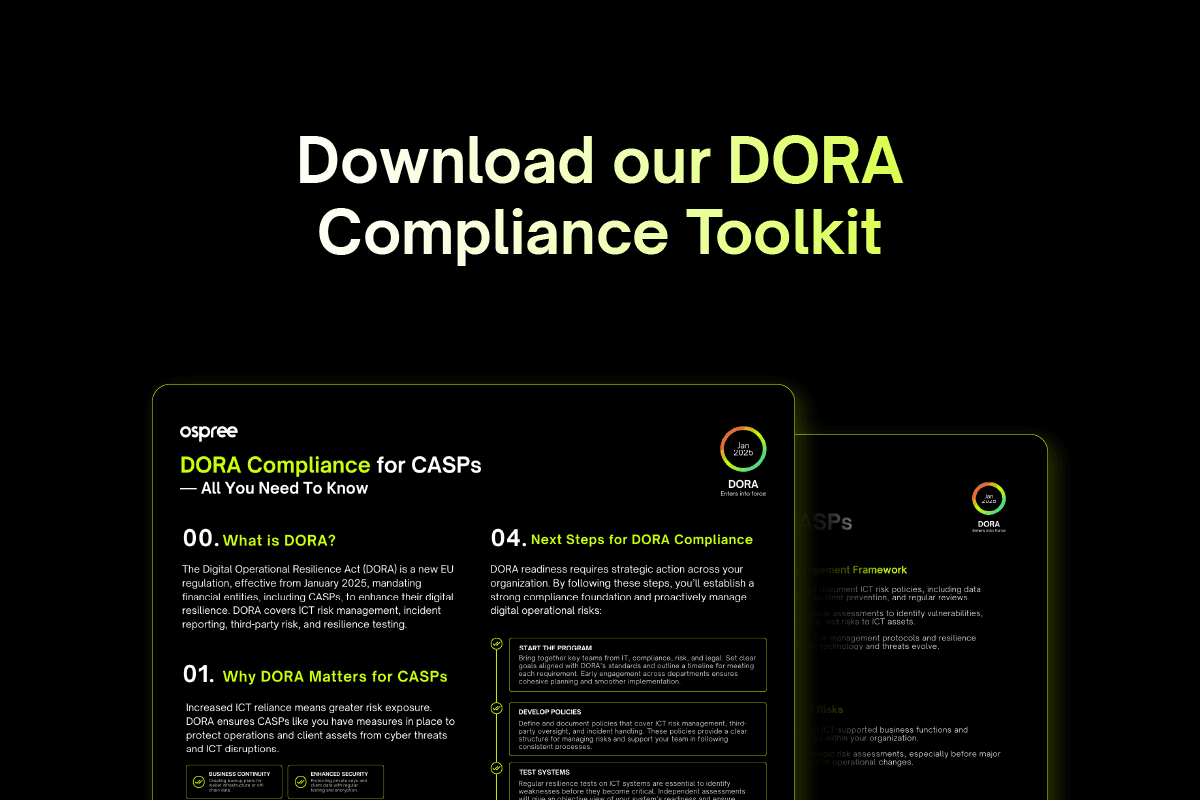The European Union’s Digital Operational Resilience Act (DORA) is set to become a regulatory milestone for financial entities, marking a critical shift in how firms—particularly those in digital asset management—must prepare for IT risks. Enacted to enhance the operational robustness of the financial sector, DORA’s reach is broad and unyielding, demanding that entities reliant on digital infrastructure adopt rigorous standards for resilience, cybersecurity, and incident management.
Crypto-Asset Service Providers (CASPs), under DORA’s watchful eye, must develop a concrete approach to managing information and communication technology (ICT) risks. For these firms, which often operate at the frontier of digital finance, DORA is as much a guide as it is a mandate, urging providers to harden systems against the disruptive forces of cyberattacks, outages, and data breaches. To assist CASPs in their compliance journey, a downloadable DORA Compliance Toolkit has been made available, featuring essential templates, checklists, and training materials to simplify the process.
Why DORA Matters for the Crypto Sector
The very nature of digital assets makes CASPs acutely vulnerable to ICT failures. Their reliance on blockchain technology and third-party services creates a unique ecosystem where the smallest vulnerability can have significant implications. As such, DORA’s introduction is both timely and essential, addressing what regulators see as fundamental gaps in ICT resilience and risk management across Europe. DORA’s impact on CASPs can be distilled into several core areas:
ICT Risk Management: CASPs must now adhere to structured policies governing how risks are assessed and managed, embedding resilience into their core operations.
Incident Reporting: DORA requires financial entities to identify and classify ICT incidents, with a mandate to report those that could impact client trust or financial stability.
Resilience Testing: Firms must engage in rigorous testing of ICT systems to expose potential weaknesses and prepare for real-world disruptions.
Third-Party Risk Oversight: Recognizing the layered risks of outsourcing, DORA calls for stringent scrutiny of third-party providers, requiring CASPs to secure contractual agreements that ensure continuity and exit strategies.
Setting the Framework: What CASPs Need to Do
Preparing for DORA compliance isn’t merely a matter of policy—it’s an overhaul of how risk is perceived, managed, and mitigated. For CASPs, the following steps are essential to meeting DORA’s exacting standards:
Establishing a Holistic ICT Risk Management Framework
Central to DORA is a call for rigorous ICT governance. CASPs must take a proactive approach to identifying and mitigating risks, which involves:
Developing clear roles within the organization for ICT oversight.
Establishing comprehensive cybersecurity measures, from encryption protocols to multi-factor authentication, to protect digital assets.
Regularly reviewing and updating risk policies to adapt to evolving threats.
Incident Management and Classification
Under DORA, the management of ICT incidents has entered the regulatory spotlight. CASPs must be able to:
Detect and rapidly classify incidents, using structured criteria to determine their severity.
Report significant incidents to regulatory bodies and inform clients of issues affecting their assets or service reliability.
Maintain meticulous records detailing each incident’s cause, impact, and resolution, ensuring accountability and continuous improvement.
Resilience Testing: From Theory to Practice
CASPs are required to adopt a testing regime that mirrors the realities of modern digital finance. To comply with DORA:
Regularly perform resilience tests to evaluate the integrity and reliability of ICT systems, employing real-world scenarios to pinpoint weaknesses.
Develop business continuity plans to ensure uninterrupted operations, particularly for infrastructure critical to digital asset transactions.
Engage in threat-led penetration testing (TLPT), a regulatory necessity that mirrors the challenges of today’s cyber landscape.
Due Diligence and Accountability for Third-Party Services
For CASPs, outsourcing isn’t merely a choice—it’s a necessity. However, DORA makes clear that firms cannot outsource accountability. Instead, they must:
Maintain an up-to-date register of third-party providers, detailing their roles and criticality to CASP operations.
Secure contractual provisions that enforce DORA-compliant resilience, including service continuity, exit strategies, and data protection.
Conduct regular performance reviews of third-party services, especially those involved in off-chain data storage or transaction processing.
Building a Culture of Resilience
Perhaps the greatest challenge for CASPs is integrating DORA into the company’s DNA. The regulation is a sweeping mandate for organizational alignment, and compliance demands more than just regulatory adherence. It requires fostering a culture of resilience:
Train employees on DORA’s operational requirements, ensuring that both technical and non-technical teams understand the stakes.
Encourage a mindset that values cybersecurity, proactive risk management, and meticulous incident handling as fundamental to the company’s mission.
The Road to January 2025: Navigating DORA’s Challenges
As CASPs move towards DORA’s 2025 enforcement date, they are likely to encounter several hurdles:
Strategic Governance: Embedding DORA into existing frameworks can be challenging, particularly as CASPs grapple with varying interpretations of “critical” ICT functions.
Incident Classification and Response: Harmonizing DORA’s incident classification with other frameworks, such as PSD-II, poses logistical and regulatory challenges.
Third-Party Risk Management: Negotiating contracts that meet DORA’s standards requires diligence, as CASPs must ensure service providers meet the same level of scrutiny.
For the crypto sector, DORA is a watershed moment, imposing unprecedented ICT risk standards on an industry built on decentralization and innovation. However, as CASPs adjust to the new regulatory landscape, they can view DORA not as a hindrance, but as a foundation for trust, security, and resilience in digital finance.
DORA is more than a regulatory box to check—it’s a roadmap for sustainable and secure digital operations in the financial services industry. For Crypto-Asset Service Providers, compliance will require a concerted, strategic effort to integrate ICT resilience at every level. As the January 2025 deadline approaches, CASPs must view DORA as both an obligation and an opportunity: a chance to build lasting trust in an industry defined by its potential, innovation, and inherent risk.
This blog post and toolkit are for informational purposes only and do not constitute legal advice. Ospree is not responsible for any actions taken based on this information. Please consult your legal advisors for DORA compliance.




